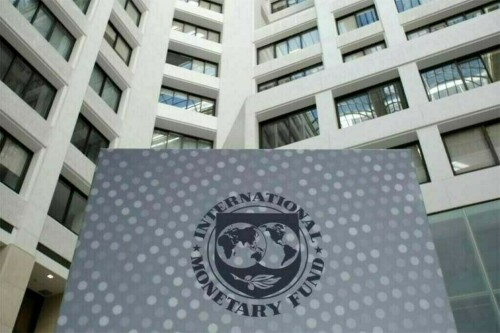IMF Anticipates Economic Forecast Adjustments Amid Trade Tensions
WASHINGTON: The International Monetary Fund (IMF) is expected to lower its economic projections due to increasing trade frictions and significant transformations in the international trading system, according to IMF Managing Director Kristalina Georgieva. However, she stated that a global recession is not anticipated.
Georgieva noted that national economies are being challenged by a restructuring of the global trade framework. This shift, triggered by recent tariffs imposed by the United States and retaliatory actions from China and the European Union, has created extraordinary uncertainty in trade policies and considerable instability in financial markets.
“Disruptions have consequences… our revised growth forecasts will include significant downward adjustments, but not a recession,” she said in her prepared statement. She also mentioned that the revised outlook would incorporate higher inflation predictions for certain countries.
“To paraphrase ‘The Wizard of Oz,’ we’re not in Kansas anymore,” Georgieva remarked to IMF personnel and journalists at the IMF headquarters in Washington, prior to the IMF and World Bank spring meetings scheduled for next week.
Georgieva cautioned that heightened uncertainty also increases the potential for financial market turbulence, emphasizing that recent fluctuations in U.S. Treasury yield curves should be regarded as a warning. “Everyone suffers if financial conditions deteriorate,” she stated.
US President Donald Trump has disrupted the global trade landscape through a series of new tariffs, including a 10% levy on goods from all countries and increased rates for specific nations, although these have been temporarily suspended for 90 days to facilitate negotiations. China, the EU, and other countries have responded with counteractive measures.
In January, the International Monetary Fund projected global growth at 3.3% for both 2025 and 2026. An updated World Economic Outlook is scheduled for release on Tuesday.
While Georgieva, speaking at IMF headquarters in Washington ahead of the spring meetings of the IMF and World Bank next week, did not provide specific details regarding the expected revisions, she cautioned that prolonged uncertainty would be costly and emphasized that the repercussions of the trade realignment would be “significant.”
According to a Reuters poll of economists, the assertive tariff strategy of the United States is anticipated to cause a noticeable deceleration in the U.S. economy this year and the following year. The probability of a U.S. recession in the coming year has risen to 45%, the highest figure since December 2023, up from 25% the previous month.
Georgieva observed that trade tensions had been simmering for some time but have now escalated. She urged nations to respond judiciously to the “sudden and sweeping shifts” observed in tariffs, which have propelled the effective U.S. tariff rate to levels not seen in many decades, prompting retaliatory actions from other countries.



Comments (0)
No comments yet. Be the first to comment!
Leave a Comment